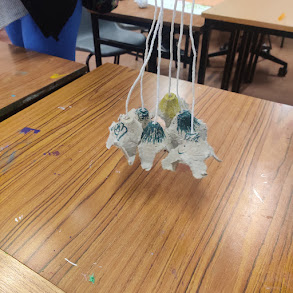- Get link
- X
- Other Apps
- Get link
- X
- Other Apps
Creative and therapeutic activity making paper objects to represent family (friends/pets etc).
Rather than talking about your family, this is a way to
visually represent it.
1.
Roll up paper into figures and secure with
masking tape.
2.
Decorate, if wish, creativity; stickers, paint,
crayon, etc
Other options:
Clay (Art therapy)
1. Paper cups
2.
Objects (animals) to represent them
(father/farmer – a sheep). This could include household objects.
3.
Small life-like figures (sand play therapy)
Personal Objectives:
- Self-Expression:
Encourage expression of themselves creatively through the representation
of family members with paper.
- Reflection:
Provide an opportunity for participants to reflect on their relationships
with family members and how they perceive each individual.
- Identity
Exploration: Allow individuals to explore and express different
aspects of their own identity as well as the identities of family members.
- Emotional
Awareness: Help participants become more aware of their emotions and
feelings toward each family member, fostering emotional intelligence.
- Communication
Skills: Improve communication skills by encouraging participants to
share their thoughts and feelings about each family member in a supportive
environment.
- Conflict
Resolution: Provide a platform for addressing and processing conflicts
within the family by representing them visually and exploring potential
resolutions.
- Empowerment:
Foster a sense of empowerment by allowing individuals to make creative
choices in representing each family member on the page.
Therapeutic Objectives:
- Family
Dynamics Exploration: Facilitate discussions about family dynamics,
roles, and patterns, using the paper representations as a starting point.
- Attachment
Exploration: Explore attachment patterns and connections between
family members through the arrangement and proximity of the paper objects.
- Cognitive
Restructuring: Use the activity to challenge and reframe negative
thoughts or perceptions about family members, promoting more positive and
realistic perspectives.
- Narrative
Therapy: Encourage participants to create narratives or stories around
the paper representations, helping them to reframe and reinterpret family
experiences.
- Mindfulness:
Integrate mindfulness techniques during the creation process to enhance
awareness of the present moment and promote a sense of calm.
- Social
Support: Foster a sense of support within the group by encouraging
participants to share their creations and discuss their experiences with
family members.
- Goal Setting: Use the activity to set therapeutic goals related to improving family relationships, communication, and overall well-being.
Location: Ireland
Ireland
- Get link
- X
- Other Apps













